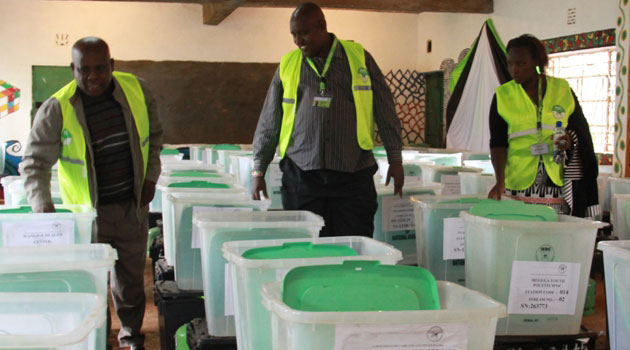
President Uhuru Kenyatta is seeking re-election for a second five-year term on his Jubilee party ticket, running against opposition candidate, Raila Odinga, who will be representing the newly formed National Super Alliance/FILE
NAIROBI, Kenya, May 25- The Human Rights Watch has asked the country’s authorities to ensure a level playing field, free from abuse for voters and candidates during the General Election.
Otsieno Namwaya, Africa researcher at Human Rights Watch says as the campaigns kick off next week on Sunday, Kenyans should be allowed to engage openly with candidates on a range of important national issues without intimidation or fear.
He has urged police to enforce the rule of law but do it within the law and specifically by protecting the right to free expression and assembly more so during the campaign period.
“Lack of accountability for electoral offenses, abuses by police, and violations of free expression and assembly in the campaign period could potentially undermine the credibility of the election,” he said.
President Uhuru Kenyatta is seeking re-election for a second five-year term on his Jubilee party ticket, running against opposition candidate, Raila Odinga, who will be representing the newly formed National Super Alliance.
Throughout Kenya’s campaign period, Human Rights Watch intends to monitor, document and analyze human rights issues on a blog that begins later this week.
The country has a history of political violence.
The December 2007 elections left an estimated 1,100 people dead and another 650,000 internally displaced, one of the darkest periods in the country.
Although largely peaceful, the 2013 elections were characterized by pockets of ethnic and inter-clan violence as well as, “police use of excessive force against opposition supporters in Kisumu protesting a court decision reaffirming the election of President Kenyatta.”
A statement by the international lobby indicates that in western Kenya, during and after the 2013 election police failed to respond or adequately investigate gang attacks.
Earlier this year, campaigns leading up to the party primaries were marred by abuse, Human Rights Watch says.
In at least two instances in March, “police in Kwale County broke up opposition meetings led by the current Mombasa governor, Hassan Joho, and later openly defended ruling party supporters who disrupted an opposition meeting in Mpeketoni, Lamu County.”
During the 2016 opposition party led protests for reconstitution of the electoral management body, the Independent Electoral and Boundaries Commission (IEBC), police used excessive force against protesters in opposition strongholds in western Kenya, killing and injuring scores of protesters.
Police should exercise restraint and remain impartial at all times, Human Rights Watch said.
“Despite a raft of legislative reforms since 2011, police investigations into election-related violence also remain very limited. Police have failed to investigate violence in Mombasa during an opposition rally and during opposition events in Migori, western Kenya, both in April. Nor have police investigated or held to account those responsible for similar violent incidents during party primaries across the country in early 2017,” Namwaya lamented.
“The threats of violence and obstructions to free expression remain the biggest challenges to the credibility of Kenya’s 2017 elections. The key is for all institutions responsible for managing this election to equitably enforce the law and protect the right of Kenyans to participate freely in the electoral process.”









































